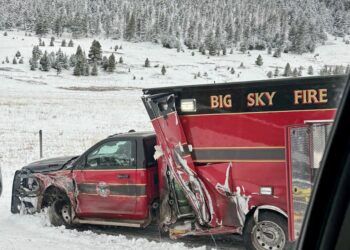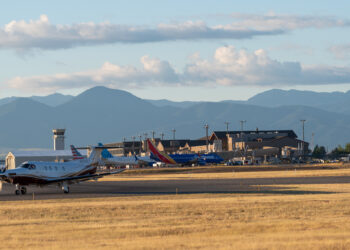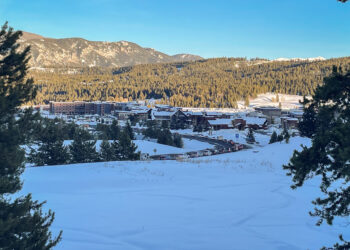How a chance encounter in Big Sky inspired a young mountaineer and a memoir
By Jack Reaney STAFF WRITER
For many, snowy mountain slopes provide an escape from the mundane, the indoors, the flatlands and crowded streets.
For Ryan DeLena, they once provided an escape from the cruel limits of misjudgment. When he first visited Big Sky in March 2014, he was 12 years old and still struggling with behavioral differences that had moved him from the public school system in preschool into a series of alternative schools that physically restrained students or locked them in solitary confinement until outbursts passed—techniques Ryan described as more traumatic than helpful.
By age 12, Ryan had found solace in skiing. Still, his struggles surfaced while waiting in lift lines, which led his father, Rob, to bring Ryan to the expansive and uncrowded slopes of Big Sky. That ski trip, among others, showed Ryan the possibility of a life beyond trauma and restraint, and beyond the hopeless picture of life painted by most adults responsible for his future.

“As soon as I saw a picture [of the Big Couloir], I said that was just the most beautiful thing I’ve ever seen, and I have to ski that,” Ryan told Explore Big Sky.
Rob called Big Sky Resort Mountain Sports and asked for an instructor with patience. They answered, ‘We have just the guy.’
“Ryan was full of ambition and very goal-oriented,” instructor Ben Brosseau recalled. “He had done a lot of research and came with a list of things he wanted to ski.”
When Ryan told Brosseau about his Big Couloir objective, Rob waited to be laughed at. Instead, Brosseau looked him up and down and said, ‘OK, let me go get a beacon.’ Brosseau, who’s instructed at the resort since 2005, assesses more than a client’s skill before bringing them into consequential terrain.
“Mentally, emotionally, [I check] all the things leading up to skiing long, technical runs like [the Big],” Brosseau said. “[Ryan] checked all the boxes pretty quickly.”
Not only did Brosseau take Ryan down the Big in 2014, but later guided 16-year-old Ryan down the gnarlier, more technically demanding Little Couloir. Ryan lost all sense of time, and mostly remembers his first eight jump turns on the Little from the GoPro footage.
The partnership between Ryan and Brosseau helped Ryan overcome the stigma associated with his developmental differences—and the limits set by other adults. He grew from therapeutic schools to public high school, and now attends college in Vermont to prepare for a promising career as a mountain guide.
On March 1, Rob and Ryan DeLena released “Without Restraint,” their joint father-son memoir describing Ryan’s challenges of growing up incompatible with the approach taken by educators and medical professionals, and Rob’s struggle to reject their advice. The book describes how skiing unexpectedly created the perfect space for a unique, energetic and misunderstood boy, who is now becoming a leader among young mountaineers. It’s also the story of parental growth: Ryan’s differences forced lessons upon Rob and his wife, Mary Beth.
Gifted
Rob and Mary Beth struggled to raise Ryan.
A former college baseball player himself, Rob expected Ryan to be an athlete. Early in Ryan’s life, that was clearly not in the cards.
“He was more interested in drilling inside the baseball to see what it was made of than playing the game,” Rob told EBS. Team sports were not a good fit.
Growing up in a Boston suburb, Ryan was a tough kid to manage. Preschool teachers suggested a neuropsychologist based on Ryan’s struggle to adapt when external factors broke linear routines.
Ryan was described professionally as “very strong on the left half of his brain, very weak on the right half of his brain,” and diagnosed with Pervasive Developmental Disorder, Not Otherwise Specified—a vague and unhelpful diagnosis, Rob said.
As a small child learning to read, he would repeat his father’s paraphrasing of picture books. Ryan wasn’t actually reading at all, he just memorized Rob’s exact wording. As a young skier, he would memorize trail maps.
“At Big Sky I can tell you every run, probably in order off the ridge and what they’re like,” said Ryan, a recurring visitor but never local resident. His photographic memory also allows him to recall every crag he’s ever climbed. He said anything that goes in sequence is glued to his memory.
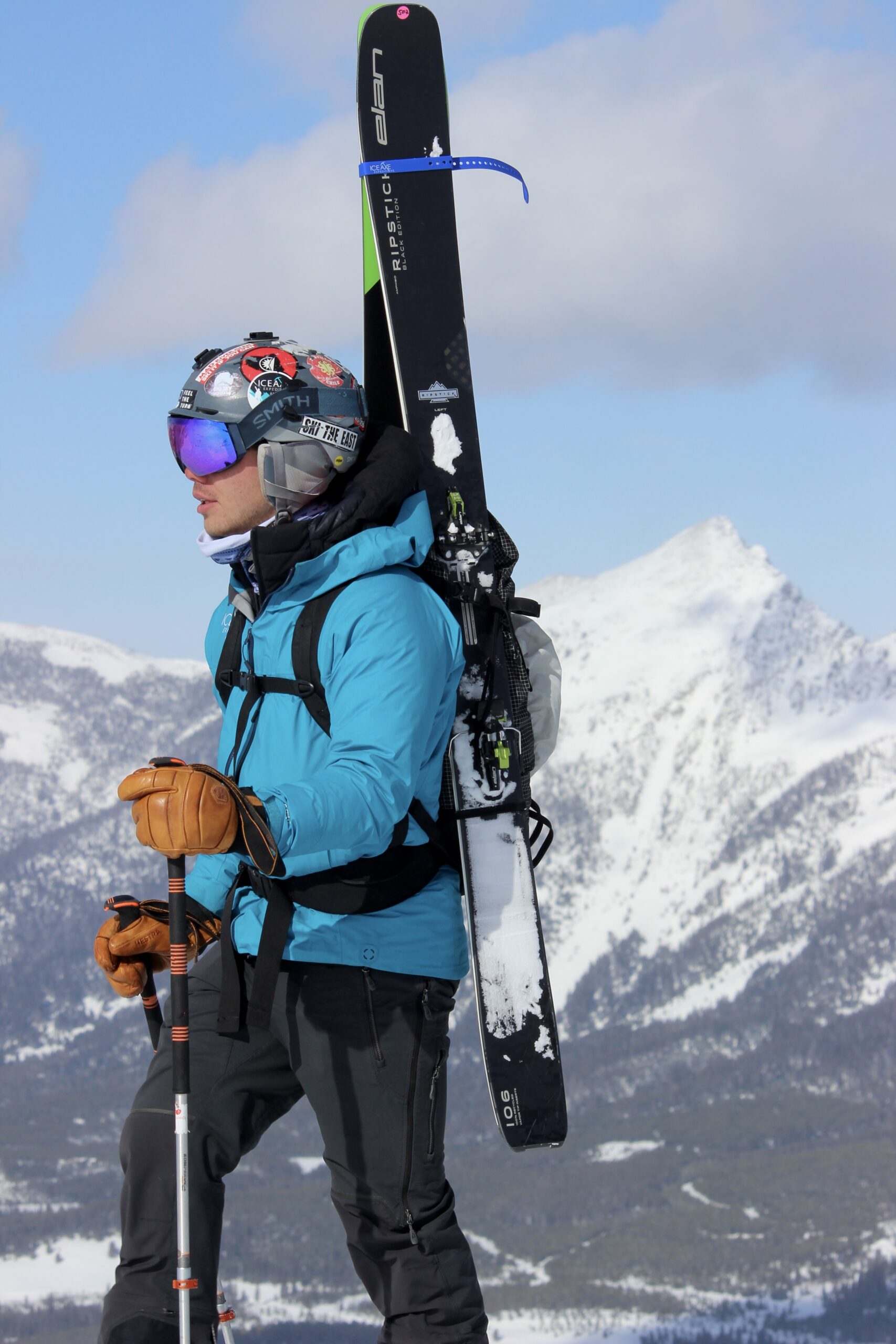
Unfortunately, Ryan’s gifts were not well understood.
“The early years were pretty chill,” Ryan said. He felt normal until preschool, when his aversion to listening caused problems. At first, teachers thought he was gifted. He was moved to a private school, “and that lasted about a day,” he said. He was fascinated by only the things that caught his interest, but he’d stand up and walk away from boring activities.
Ryan’s local school district recommended a therapeutic school, which relied on a “holding environment” in which staff would hug and hold distressed students.
“The first day, [my teacher] put me on the floor and restrained me. She covered my mouth and I couldn’t breathe, and I had bruises on me,” Ryan recalled. “That’s when I first realized my life was about to be really different.”
He was about 5 years old. He remembers wanting to get through the day as easily as possible, “just trying to survive.”
“He was restrained hundreds of times,” Rob recalled. “As he grew stronger, [staff] would put their knee on his back in the hallway until he calmed down.”
Ryan spent four years being restrained at home and at school—where the teachers misused the restraints as a punishment and not a calming measure, as designed—before Rob became fed up with his son’s treatment.
“[Restraining him] was the biggest mistake of my life,” Rob said. “I never should have agreed to it… It’s not hard to realize how wrong I was, and how many terrible decisions I made. I just wanted to fix him and make him like all these other kids.”
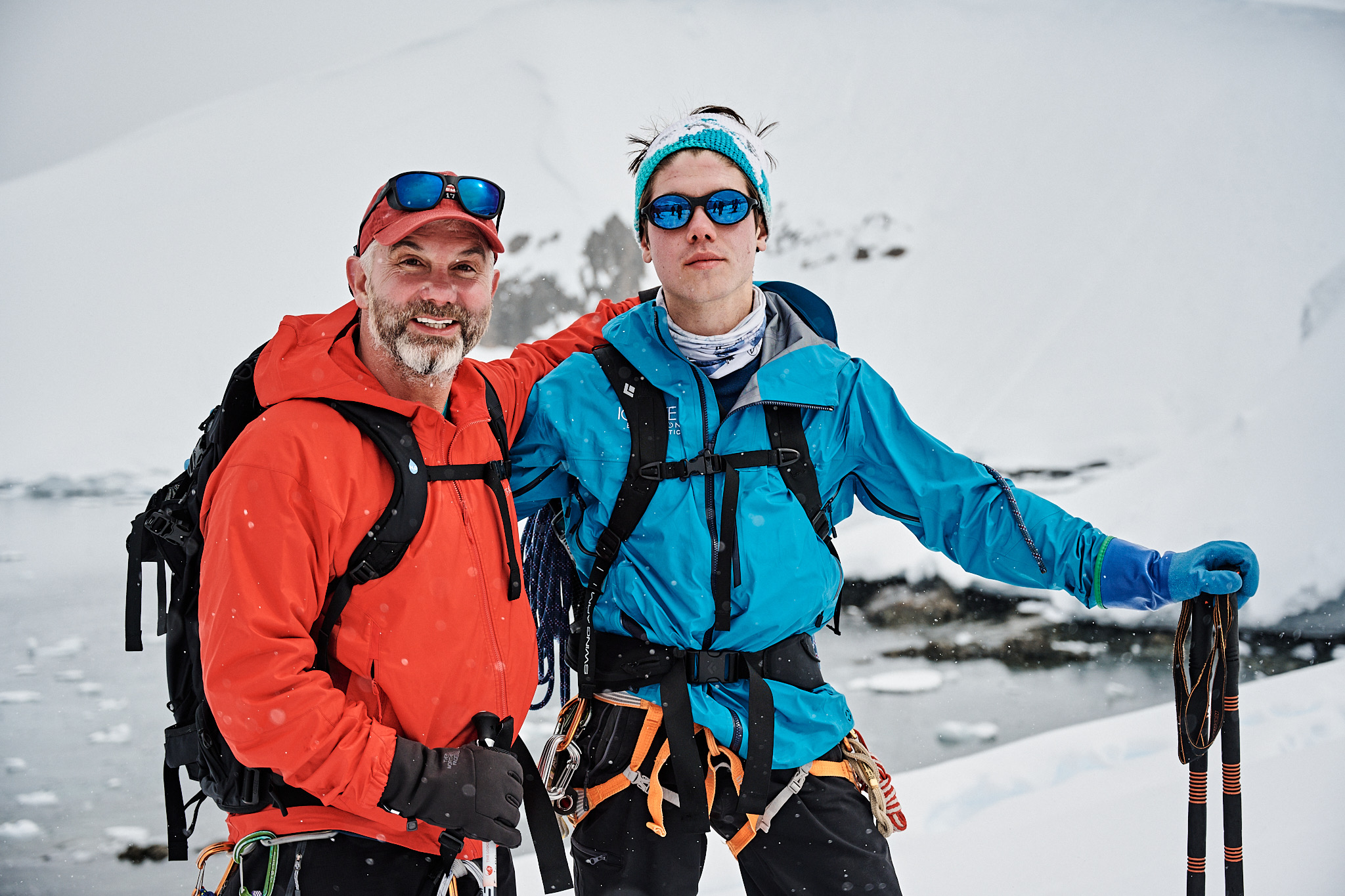
“They used my behavior in preschool to make a pretty big decision about my life,” Ryan said.
He said the attitude in Sudbury, Mass. is that people who go against the grain are shunned.
“Their immediate reaction [to my parents] was, ‘there has to be something wrong with your kid. Why would he not want to make macaroni necklaces?’”
Having attended a therapeutic school felt like a criminal record, Ryan said. Educators put deliberate and unnecessary obstacles in the way of his progress back to standard public education and expected Ryan to be perfect. But as he developed a trauma response to being restrained, he said he was never going to get out of an environment that physically escalated disagreements.
“Whenever I had conflict with an adult, I immediately assumed it was going to lead to me getting hurt,” he said. “Whenever I got in a fight at home, I would run outside and climb a tree, like 60 feet high, where I knew nobody was gonna get me.”
A natural fit
Rob hadn’t skied for 25 years when he made the risky decision to take 7-year-old Ryan to Nashoba Valley Ski Area in Massachusetts in 2009.
“By the time we got off the top of the magic carpet, I never thought we would get that far. So I didn’t even tell him how to ski,” Rob remembered. “Ryan just looked at me, [straight-lined] to the bottom and made a turn to get back into line.”
Ryan said he learned more about skiing from “Curious George” than from his dad.
“I first saw skiing on [the television show] ‘Curious George’. I remember they were going straight down the hill. So I kind of started going straight down the hill.”
Ryan wanted to get back in line, so he pointed his body toward the magic carpet and his edges took him there.
Rob said Ryan was like a cat in his first few days skiing, never falling once. Soon, they progressed to Wachusset Mountain, then Loon Mountain in New Hampshire, and Stowe Mountain in Vermont where Ryan skied his first double-black.

It was intuitive to Ryan. He said he never questioned how natural skiing felt, until he spent two winters ski instructing at Nashoba Valley in high school and realized how unnatural it is for some people to balance on skis. He knew skiing aligned with his personality in a way nothing else did, feeding his intrinsic desire to explore. He recognized his calling.
For years, educators still didn’t.
“When I went out West, I was able to have some big adventures,” Ryan said. “I was getting so much positive reinforcement, being a young kid taking on that terrain.
“And then I would go home, and I couldn’t go to the bathroom without adult supervision.”
Between confinement and ski slopes
He finally left the first school with restraints in 2010, opting for another school with a similar approach that promised fewer restraints.
That year, teachers discovered his “Extreme Ryan” YouTube stunt videos and reported him to the state with concerns that his behavior was escalating. Exhibit A: he jumped out of a second story window, parkour-style. Exhibit B: “real-life fruit ninja” with a bread knife.
Authorities convinced Rob and Mary Beth to check Ryan into a mental hospital. Ryan was medicated and told he’d spend three days there. The medication doctors prescribed was known to occasionally cause Stevens-Johnson Syndrome, a sometimes-deadly skin infection.
On day four, Ryan thought he was being abandoned, and began making daily attempts to escape.
In order for Ryan to be released from the hospital, he needed to show stability. Rob planned a ski trip as incentive and told Ryan they’d ski for the number of days he behaved.
Ryan was released after two weeks, and they visited Utah. On the flight home, Rob noticed a tell-tale rash on his leg. That was the last straw for Rob. He discontinued that medication, and began working to convince doctors that Ryan didn’t fit into their standard playbook, similar to his battle with educators.
By 2014, Ryan attended a third school that enforced discipline by locking kids in a tiny room with a metal door and no windows. Ryan said that was almost more traumatic than restraints.
The father and son couldn’t find a path to public school until a heated meeting with a school administrator in 2016. Rob stood up for his son—loudly—and the administrator finally admitted the name of a fourth school, where Ryan could spend a year proving himself before attending Lincoln-Sudbury High School.
“As soon as they figured out I wanted to go to public school, they put constraints on me,” Ryan said of that fourth school. The teachers would taunt his behavior, saying, ‘they won’t accept that in public.’
“They really pushed me to the limit and I had to try so hard not to crack.”
That school tried to convince Ryan to stay for a second year, but he declined. He knew he wasn’t getting a full curriculum.
“I went to public [school in 11th grade], and everything went perfectly fine,” he said. “There were no issues, I proved everybody wrong, got good grades and was involved with the community.”
Despite the hardship, Ryan gained perspective on life through his struggles with education. After being told—and believing—he wouldn’t belong “with regular people,” he had to show himself he could fit in.
“I was getting so much positive reinforcement, being a young kid taking on that terrain.
-Ryan DeLena
And then I would go home, and I couldn’t go to the bathroom without adult supervision.”
“This was a kid which everyone had told us to put in a group home when he was 11 or 12,” Rob said. “He got into college.”
Ryan said being accepted to Northern Vermont University wasn’t a huge deal to him, as it isn’t particularly selective. He’s finishing his junior year in a respected Adventure Education program.

“When I was a kid, there were people who told me that I was maybe going to be able to work. I would probably do a solitary job like making furniture. No social interactions. Now I have a network of guiding clients, I have a girlfriend,” Ryan said.
“All of those things they said about me I’ve proven wrong, grown out of or conquered.”
From student to guide
Ryan dreams of ski guiding in Antarctica. This past summer, he got his foot in the door.
He tail-guided in Antarctica with Ode Silvonen, a Finnish guide for Ice Axe Expeditions. He called the experience “super mind-blowing,” and said it’s ushering in the next phase of his life. He was also surprised how many of the guides had heard of his college’s program.
“It’s super cool that the journey can start some place like Nashoba Valley, when there wasn’t much hope,” Ryan said. “How did this become life?”
That life came full circle in April 2021, when Ryan guided Brosseau at Tuckerman Ravine in the White Mountains of New Hampshire.

Despite some resistance early on, Ryan has trusted Brosseau’s coaching for years. Ryan was self-taught and always pushing his limit. But on a seven-day trip to Portillo, Chile, Ryan was coached on unforgiving race skis to help break some bad habits. He took it down a notch and had a chance to focus on fundamentals, Brosseau said.
“Whatever Ryan’s initial vision was for being a skier, I think [it has evolved] in the last 10 years. He’s learned there’s a lot of different paths he can take.”
Brosseau foresees a lifelong friendship with Rob and Ryan.
“There will always be a coach-student, guide-student side of that relationship,” he said. “But Ryan has become such a knowledgeable skier, climber, ice climber, and he’s a person I turn to if I have a question about mountaineering. He knows the gear, he knows the terrain, he’s built his own network of people who he’s mentored and people who have mentored him.”
Brosseau and Ryan had a conditions window in N.H., so Ryan chose a v-shaped couloir around a rock buttress; Ryan said Dodge’s Drop is the hardest descent of Tuckerman Ravine.
“It can be kind of intimidating for people to ski,” Ryan said. “He ripped it. He had fun and compared it to Class Six on the Headwaters.”
“Ryan was my guide,” Brosseau said. “And I remember that being the first true time where the roles switched. He was the knowledgeable guide… making sure we had the right gear, making sure we knew the hike, the [descent] route, the snow conditions, parking; he was so tuned into how this day was going to go, how he was going to design the experience for me.”
Ryan was honored to show Brosseau around. He ran into pretty much everybody he knew, too, and friends joined the pair for a lap.
“He put the trust in me. I was stoked,” Ryan said. “I was so excited to have him see the place for the first time. I think we had a good weather window, we chose our lines well. But we just had good luck.”
PLUS: Ryan and Rob joined Explore Big Sky’s partner podcast, Hoary Marmot, in February 2023.







